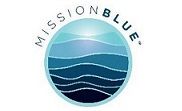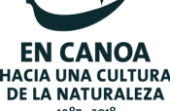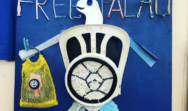Community Cold Storage
Pilot Project Goals
Put control of food production and direct delivery into the hands of subsistence and commercial fishers.
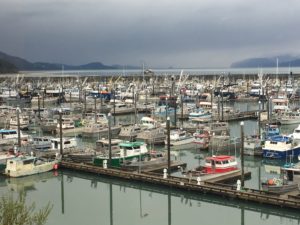
Fishing fleet in Cordova, Alaska. Photo © Eyak Preservation Council
The Community Cold Storage (CCS) Proof of Concept pilot project is building a replicable community food processing and preservation model that perpetuates public benefit outcomes. The CCS system will offer space, services, time and market support in a Department of Environmental Conservation (DEC) certified seafood processing facility. The CCS will serve subsistence fishers and gatherers to process, freeze, and value-add to their seafood harvests alongside commercial fishers, increasing the quality of their traditional foods and access to direct-market their commercially harvested seafoods.
For the Proof of Concept, we will foster the development of an organization that ensures measures for a successful social-profit model that encourages community outreach to meet the concerns and food needs of rural communities. The work of the CCS is to create a scalable proof-of-concept for an affordable and portable cold storage model that will support the conservation of wild salmon and preservation of indigenous culture through education and empowerment to support truly sustainable and regenerative lifeways for all people.
The Mission
The Community Cold Storage Pilot Project’s mission is to serve rural communities by providing affordable and easily portable modular systems and facilities that will improve and value-add methods of handling subsistence and commercial foods in order to retain, enhance and preserve unique subsistence-based culture and heritage while maintaining and preserving the quality of traditional and local food resources, necessary for providing critical food security and food sovereignty futures.
The Need
A community cold storage facility will serve subsistence and commercial fishers and their communities as a replicable business model catalyzing renewable economies that incorporate state-of-the-art technologies.
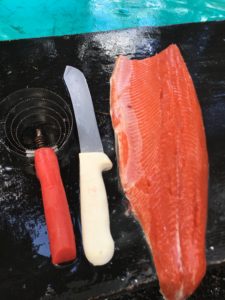
Hand-cut salmon filet. Photo © Eyak Preservation Council
People have always relied upon seafoods as a basic resource to sustain life for its nutritional, cultural and economic value. Yet in the current world marketplace, local, national and international seafood processing facilities dominate the entire industry by controlling the price of seafoods from the fishermen’s catch to the wholesaler to the consumer. When the price of sockeye salmon drops to less than $2 per pound, fishers and locals still have to pay $3.75+ per pound for basic processing, vacuum sealing and freezing their catch, which keeps them at the lowest base of a living wage.
Fish-based food provides a unique combination of high-quality proteins, rich in omega-3’s and vital nutrients that make it an invaluable food source. However, quality and nutrient values can be lost within the first hour of harvest, through improper onboard and onshore handling, cooling and processing.
Communities, fisheries and industries worldwide have a responsibility to push for less fish waste, less mystery fish and more traceability and the maintenance of low-impact, socially equitable, best handled fishing practices that are sustainable, regenerative and that build renewable economic programs for communities. The CCS will serve subsistence-based communities and commercial fisheries as well as farmers, as a replicable food industry model for rural communities.
The Location
Proof of Concept – Cordova, Alaska
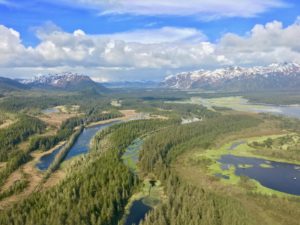
Prince William Sound Watershed – Alaska. Photo © Eyak Preservation Council
The first CCS Proof of Concept will be developed and installed in Cordova, Alaska. This fishery, due to its combination of traditional subsistence fishing, hunting and gathering and commercial fishers alongside a world-renowned fishery provides a perfect testing region for the CCS Connex facility concept. Since it is an off the road system, it also presents a unique contrast of rural community-based subsistence food and economic needs with international demand for world famous wild salmon and seafood products. That this year’s fishing season unexpectedly collapsed for a myriad of reasons, clearly demonstrates the need to present tangible solutions for affordable and predictable processing and freezing, kitchen space for value-added products, and locking in traceability measures to ensure quality.
In Cordova, this unique Gulf of Alaska community depends on the world-renown Copper River Delta – which is still 98% roadless and wild – and Prince William Sound seafoods for sustaining their health, nutrition and their wild salmon way of life. The CCS project fulfills years of research by the Eyak Preservation Council, a local non-profit which is led by the local Indigenous Eyak people who are adamant about building resilient community models for the future and regenerative wild salmon-based economies that honor wild foods, provide for food sovereignty and food security while empowering fishers to thrive in a regionally driven cottage and direct marketing industry.
vvlx,
hentai,
xporn,
xnxx,
sex việt,
Family Practice Doctors Near Me,
Ratify Treaties,
Best Hookup Apps,
Brunch On A Wednesday,
Comfortzone,
Plaza Premium Lounge Orlando Reviews,
Catering 77002,
Cauliflower And Coconut Curry,
Usa Rail Pass,
Active Duty Service Member,
Patch American Flag,
Farfetch Coupon Code,
Connect Google Mini,
Nike Mens High Top,
Bronny James Usc Basketball,
Anal Sex Prep,
Aesports,
Check Balance On Debit Card,
Add People Trustpilot,
Skype Ids,
